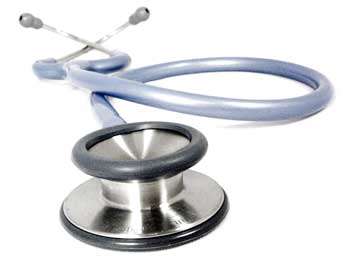 By Stethoscopes (Own work) [CC BY-SA 3.0 or GFDL], via Wikimedia Commons
By Stethoscopes (Own work) [CC BY-SA 3.0 or GFDL], via Wikimedia CommonsOnly about 10 percent of the 21 million Americans who meet the need for care for an alcohol or drug use disorder receive any form of treatment, and much of the treatment available does not meet standards for evidence-based care. There are many attitudinal and systemic reasons for this treatment gap, including stigma against treating people with addictions and institutional barriers to providing or funding addiction treatment. Another obstacle is the fact that, until now, addiction medicine has not been a recognized area in which physicians can specialize—a fact that has had important implications for the quality and amount of education that medical students receive and that new physicians are given in their residency training for addressing patients with substance use disorders.
A major milestone was reached on March 14, 2016, when the American Board of Medical Specialties (ABMS) formally announced recognition of the field of Addiction Medicine as a medical subspecialty. This is a development with enormous symbolic and practical implications for health care and for those affected by drug and alcohol use disorders, including nicotine addiction. It signals the legitimacy of Addiction Medicine as a field of specialized study and practice, and it will enable the accreditation and expansion of Addiction Medicine training programs.
Being certified by an ABMS-recognized medical specialty or subspecialty demonstrates a physician’s expertise in that specialty area. "Board certification" is thus a prized and necessary credential to work as a medical specialist, assuring that a physician meets the highest standards in his or her particular field. The emergence of this standard credential for Addiction Medicine considerably raises the bar for the quality of care in this crucial medical domain, and it will lead to major enhancement of the health care workforce.
Until now, the only physicians able to gain certification as addiction specialists have been psychiatrists. Addiction Psychiatry (ADP) has been a subspecialty of psychiatry since 1992. ADP physicians are experts in substance use disorders and their psychiatric comorbidities for patients seen in primarily psychiatric venues. The new Addiction Medicine subspecialty will be open to physicians with any primary medical specialty. Addiction Medicine physicians will be experts in substance use disorders and their medical comorbidities for patients seen mainly in primary care venues.
Until now, none of the more than 9,500 accredited U.S. graduate medical education residency programs have had training programs in Addiction Medicine, and programs that cover addiction in their curriculum have few training or certification requirements ensuring that students learn prevention and treatment curricula that are up to date with current science. The new Addiction Medicine credential will be a powerful force for ensuring that treatment of substance use disorders in the United States is based on the current state of the evidence and consistent with our understanding of addiction as a brain disorder.
Another result of this new development is that it will facilitate insurance coverage for patients seeking and receiving services from board-certified addiction specialists, as well as facilitate reimbursement to physicians, clinics, hospitals, and health systems that offer services in Addiction Medicine. This will create important institutional incentives for health care to invest in prevention and early intervention in order to reduce the costs of treating substance use disorders once they have progressed to their severest forms.
Recognition of Addiction Medicine by the ABMS was the result of years of concerted effort by the American Board of Addiction Medicine (ABAM), the Addiction Medicine Foundation, and the American Society of Addiction Medicine with the support of NIDA and other federal partners such as the National Institute on Alcohol Abuse and Alcoholism and the White House Office of National Drug Control Policy.
In a statement issued to mark this milestone, ABAM President Robert J. Sokol summed up its significance: "This landmark event, more than any other, recognizes addiction as a preventable and treatable disease, helping to shed the stigma that has long plagued it. It sends a strong message to the public that American medicine is committed to providing expert care for this disease and services designed to prevent the risky substance use that precedes it."
